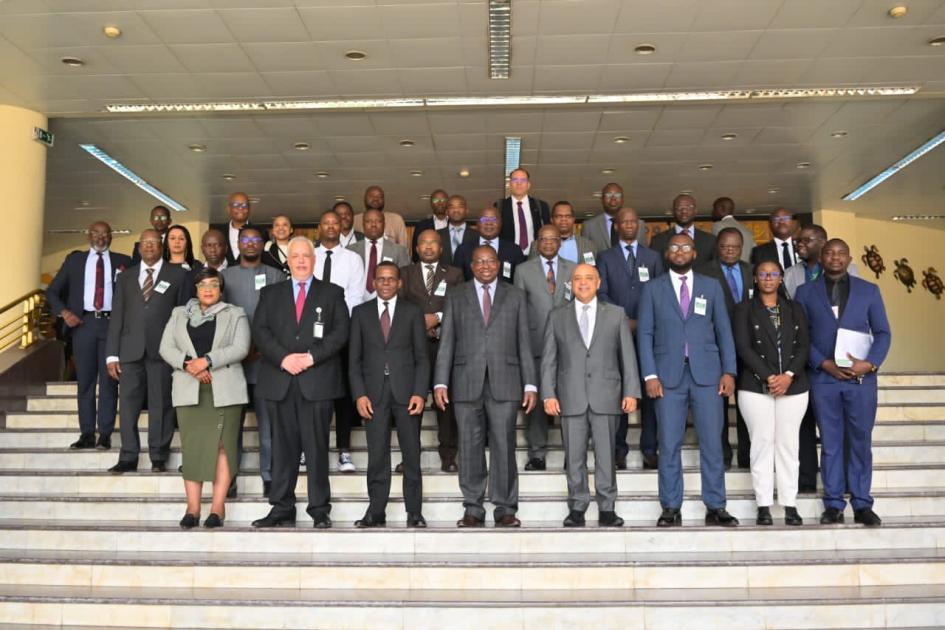
The African Union has concluded a three-day meeting of the Specialized Technical Committee on Finance, Monetary Affairs, Economic Planning and Integration- Sub-Committee on Tax and Illicit Financial Flows under the theme “Tax in Africa: contemporary issues affecting the continent” and adopted recommendations that ensure African interests are protected in the design and implementation of the global tax rules, and ways to improve domestic resource mobilization for Africa’s development.
The meeting convened by the African Union Commission department of Economic Development, Tourism, Trade, Industry, Mining (ETTIM); and supported by the African Tax Administration Forum (ATAF), was attended by Experts and Senior Officials from the Ministries of Finance, Tax Administrations, Government Specialised Agencies, Central Banks of the AU Member States, representatives from the Regional Economic Communities (RECs), African Tax Experts, Civil Society Organisations (CSOs), Non-Governmental Organizations (NGOs), Investigative Journalists, and Academia interrogated key issues on the tax regimes in Africa and made recommendations to guide possible reviews and reforms of national tax policies to protect Member States’ tax bases.
The meeting discussed parameters of the African position on the Promotion of inclusive and effective tax cooperation at the United Nations and on the consideration of the enactment of a Domestic Minimum Top-up tax for tax base protection ahead of the incoming global tax rules; adopted recommendations to use the VAT toolkit by ATAF for improved revenue collection on cross-border supplies; and identified areas where future legislative action or coordination would benefit Member States, the African Union and relevant partners, in regard to addressing the issue of wasteful tax incentives, stemming of Illicit Financial Flows respectively, and improving continental domestic resource mobilization necessary for the development of the continent.
The digital economy has experienced unprecedented growth over the past few decades, transforming the global economic landscape and reshaping the way businesses and individuals interact. This phenomenon has been driven by rapid advancements in technology, widespread internet access, and the increasing penetration of smartphones and other digital devices. However, this increased consumption of digital goods and services, delivered across borders and intangible in nature, has brought with it challenges on the difficulty in establishing the appropriate jurisdiction for tax collection, as well as determining the value for taxation purposes.
These developments have had a negative impact on Africa’s ability to mobilize revenues. Africa is therefore looking to actively engage in the global tax debate at the United Nations on International tax cooperation, and the opportunities it presents for increased domestic resource mobilization. Further, the new global tax rules will have an impact on existing national tax incentive policies and present an opportunity for African countries to protect themselves from ceding their taxing rights to countries where multinationals are resident on existing tax incentives lower than the 15% global minimum tax, according to the new rules. This requires African countries to enact domestic minimum top-up tax legislation to tap into this revenue. Similarly, revenue collection from e-commerce goods and services requires the implementation of simplified VAT regimes.
Amb. Albert Muchanga, African Union Commissioner for Economic development, Trade, Tourism, Industry and Minerals, noted that to effectively operationalize the UN Convention on International Tax Cooperation, the process must be inclusive in incorporating the views of existing African structures and leverage the work of the UN Committee of Experts on International Tax Cooperation. Further, the Member State-led intergovernmental body ought to have a well-resourced technical structure to focus on specific pain points in developing countries not addressed by previous initiatives to address gaps in tax cooperation. “At the continent level, the core issue is how Africa can develop tax administrations to increase investments from the current level of 20% of GDP to 40%. By incorporating the views of existing African structures, the operationalization process of the Convention will ensure accountability and full ownership by the Member States.”
Raymond Nazar, Head of Policy Unit at the Ministry of Finance of the Republic of Ghana and the Chair of Experts of Sub-Committee on Tax and Illicit Financial Flows called for improved tax collection systems supported by trade and investment to shield the continent from the vulnerabilities to external shocks and dependency. “Estimates show that enacting legislation to protect tax bases from losses due to tax incentives could result in an additional revenue of around $220 billion while cross-border transactions and e-commerce have the potential to generate approximately $40 billion in revenue for the African industry by 2023”. The domestic resource mobilization, he noted, is critical as the continent builds back economies from the Impact of; the COVID-19 pandemic, the Russia- Ukraine crisis, climate change, drought and food insecurity.
With multilateral financing becomes increasingly inadequate, and while international private financing has become costly owing to poor credit ratings stemming from structural issues and systematic bias, and an international tax system skewed unfavorably toward developing countries, Antonio Pedro, Acting Executive Secretary, United Nations Economic Commission for Africa (ECA) underscored the need for a complete overhaul of the global financial system, the creation of an operational debt relief and restructuring framework, strengthened domestic resource mobilization as well as an inclusive international tax system. “Global financial architecture reforms need to be coupled with an international tax framework that can ensure the taxing rights of African countries in an inclusive and equitable manner. As such, it is critical to formulate an African Position on the UN Tax Convention.”
For Africa to realize the aspirations of Agenda 2063, Logan Wort, ATAF Executive Secretary emphasized the urgency in addressing the tax regime gaps to boost domestic resources mobilization noting the importance of domestic taxes such as VAT to African economies. “As directed by the Ministers in the 5th Ordinary Session of the Specialized Technical Committee on Finance, Monetary Affairs, Economic Planning and Integration, together with the African Union Commission, we have developed the Suggested approach to Domestic Minimum Top-up Tax. This is a design feature to offer protection to Member States who may be exposed to the effects of the Global Minimum Tax as agreed under Pillar Two of the Inclusive Framework”. Further, ATAF has published a VAT Digital Toolkit for Africa to help African jurisdictions secure VAT in the digital economy by providing support for the effective collection of VAT on e-commerce transactions.
To improve domestic resource mobilization, Africa is also keen on stemming Illicit Financial Flows to ensure sustainable development financing, critical for the realization of the goals of the AU Agenda 2063. GIZ Programme Manager, Gerhard Mai, restated the committed of GIZ in the fight against Illicit Financial Flows through the Good Financial Governance (GFG) Programme in Africa, and the Global Programme on IFFs by strengthening governance systems, tax administration and addressing IFF. “Your conference is of very high relevance since many countries – not only in Africa – are facing serious socio-economic challenges because of the impacts of the COVID 19 Pandemic as well as the Russia- Ukraine crisis. This leads to high inflation, reduced tax incomes and increased debts.”
The outcomes of the Sub-Committee meeting will be considered at the 6th Ordinary Session of the Specialized Technical Committee on Finance, Monetary Affairs, Economic Planning and Integration, scheduled from 17 to 21 July 2023 in Nairobi, Kenya to influence Africa’s policies and consensus on improved tax regimes, and stemming illicit financial flows towards increased domestic resource mobilization.
Separately, and in recognition of tax as a critical enabler for Africa’s development, the AUC and ATAF signed a memorandum of understanding for the latter to provide tax technical support to the Commission in implementing its tax strategy, addressing illicit financial flows (IFFs), and addressing emerging tax issues.
Original Source: African Union
